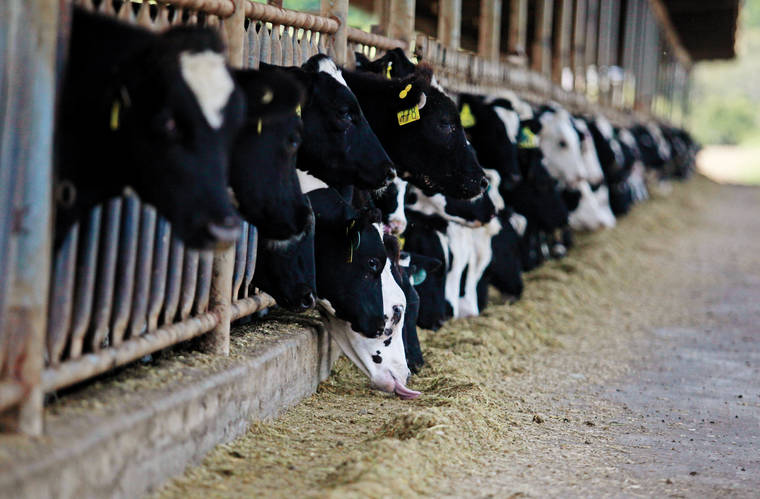Although Big Island Dairy has “satisfactorily completed” all closure requirements set forth in an agreement with the state Department of Health, others have shown interest in the Ookala property for future dairy operations.
Hamakua Councilwoman Valerie Poindexter confirmed on Friday an October meeting between “several people who want to open up a dairy in Ookala” and the community group Kupale Ookala, “so the people interested in opening the dairy would understand what their concerns would be.”
She did not name the interested group.
Residents of Ookala had endured releases of manure-laden water from Big Island Dairy into nearby gulches that run through or next to the community.
According to Poindexter, those interested in bringing another dairy to Ookala spoke about bringing in a smaller breed of cow, and said they would not use an effluent pond or a controlled animal feeding operation. Instead the cows would graze and be brought in for milking.
“We were very clear in the meeting, no matter the scenario you present, this is not the place for a dairy,” said Charlene Nishida, an Ookala homeowner and member of Kupale Ookala who was in attendance.
Nishida said the conversation “sounded very familiar to the conversation Big Island Diary had when they first came to town. Until the Department of Agriculture clearly takes a stand that this location is not conducive to a dairy, we’re just going to keep having the same problem.”
Poindexter also scheduled an October meeting with Gov. David Ige and the interested operation to discuss “how this dairy would best suit this area” and how to design a dairy that would work in the environment.
“It sounds good for now, but time will tell and we’re hoping to have lots of discussion with the Department of Health before they proceed with anything because we want to make sure what happened with the last dairy does not repeat itself … On the front end, we want to make sure their wastewater management is in place.”
There are still concerns, though.
“I have a lot of concerns because people can … put great things down on paper (but) who’s going to hold their feet to the fire to stick to what plans and they have offered to do?” Poindexter said. “That’s our main concern. From past history, the Department of Health has not been there for us. Will they be here for this community when a new company takes over? … We’re supposed to have agencies that will help protect the communities and keep people in compliance with the Clean Water Act, but past history has proven that the Department of Health has failed us. Will they step up to the plate this time and protect the community?”
Poindexter said three parties have reached out to her about the land, which is managed by the state Department of Agriculture.
A Department of Agriculture spokeswoman said Big Island Dairy still holds the lease on the property. There has been interest from other parties, but the spokeswoman declined to provide further details.
It is unclear if the the dairy, which has been owned by Steve and Derek Whitesides since 2011, has fully vacated the state-owned property.
Big Island Dairy and the DOH entered into an agreement at the end of March that addressed the numerous discharges of wastewater containing manure from the dairy into state waters during the past two years.
In April, the DOH reported 3.5 million gallons of stormwater mixed with wastewater were discharged from the dairy. An estimated 2 million gallons of wastewater mixed with storm water were discharged from the dairy’s wastewater lagoons in February.
Spills, discharges and overflows from the lagoons also were reported in April, May, August and December 2018.
DOH spokeswoman Janice Okubo said the agreement required ceasing the discharge of pollutants into state waters, removing animals from confinement, closing down all dairy production and processing operations, eliminating the wastewater lagoons and removing fuel and other chemicals from the property.
Additionally, the DOH earlier this month directed Big Island Dairy to pay the Center for Food Safety $87,000 in lieu of a penalty payment to the department as the last remaining obligation under the agreement, she said.
“The CFS is a nonprofit organization affiliated with the community group in Ookala which pursued legal action against the dairy,” Okubo said. “The payment amount of $87,000 was based on the penalty of $79,000 agreed upon in the (agreement) as well as two additional penalties of $4,000 each for discharges that occurred after the (agreement) went into effect.”
According to Okbuo, the Center for Food Safety will implement a series of projects, including upgrades to the local drinking water system, sampling and disinfection of soil contaminated by excess manure runoff and upgrades and maintenance to local storm water infrastructure, as budget allows.
“Once payment is received by the CFS, the DOH will close the enforcement action associated with Big Island Dairy,” she said.
Poindexter said the money is a “drop in the bucket for the damage they did. With that money, we’re trying to figure out how to best use it for mitigation purposes …”
Email Stephanie Salmons at ssalmons@hawaiitribune-herald.com.



